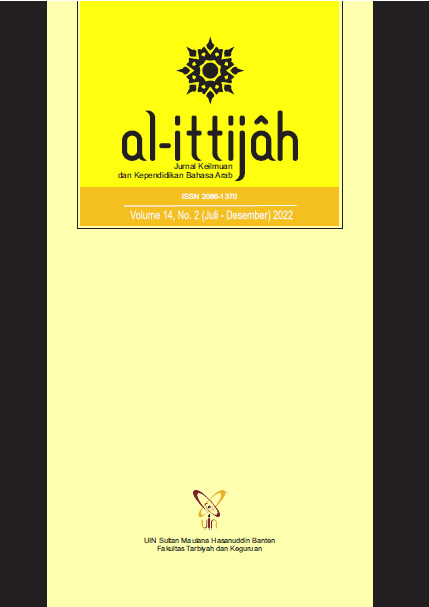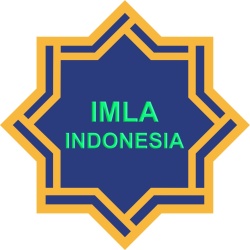Learning Arabic in Indonesia: Problems and Solutions from Vygotsky's Sociocultural Perspective
 DOI:
DOI:
https://doi.org/10.32678/alittijah.v14i2.7531
 Abstract viewed : 367 times
|
Abstract viewed : 367 times
|  pdf downloaded : 0 times
pdf downloaded : 0 times
Keywords:
Arabic language education, ociocultural, VygotskyAbstract
The purpose of this study is to reveal the problems found in the process of learning Arabic. These problems and solutions will be reviewed from a sociocultural perspective a la Vygotsky. The research method used is the qualitative method of literature. The data presented comes from several sources such as books and research articles related to research objectives. The result of this study is that Vygotsky's theory is based on three main aspects, namely genesis, Zone of Proximal Development (ZPD), and mediation. There are three problems in learning Arabic according to sociocultural theory, namely sociocultural differences, lack of interaction in Arabic, and a lack of Arabic language environment. While the solution to these problems is multicultural-based, activity-based, and environment-based learning planning.
Downloads
References
Al-Khuli, Muhammad Ali, Contrastive Transformational Grammar, Contrastive Transformational Grammar, 2017 <https://doi.org/10.1163/9789004348226>
Danoebroto, Sri Wulandari, ‘Teori Belajar Konstruktivis’, P4TK Matematika, 2 (2015), 191–98
Febriani, Suci Ramadhanti, and Arifka Mahmudi, ‘IMPLEMENTASI PEMBELAJARAN KOOPERATIF DAN INDEPENDEN DI ERA REVOLUSI INDUSTRI 4.0’, Al Mi’yar: Jurnal Ilmiah Pembelajaran Bahasa Arab Dan Kebahasaaraban, 4.1 (2021) <https://doi.org/10.35931/am.v4i1.371>
Hyun, Choi Chi, Martinus Tukiran, Laksmi Mayesti Wijayanti, Masduki Asbari, Agus Purwanto, and Priyono Budi Santoso, ‘Piaget versus Vygotsky: Implikasi Pendidikan Antara Persamaan Dan Perbedaan’, Journal of Engineering and Management Science Research (JIEMAR), 1.2 (2020), 286–93
Islam, Asep Muhammad Saepul, ‘FAKTOR DEMOTIVASI PEMBELAJARAN BAHASA ARAB DALAM PERSPEKTIF SISWA MADRASAH’, ARABIYAT : Jurnal Pendidikan Bahasa Arab Dan Kebahasaaraban, 2.1 (2015) <https://doi.org/10.15408/a.v2i1.1511>
Lokita Purnamika, Utami, ‘Teori Konstruktivisme Dan Teori Sosiokultural: Aplikasi Dalam Pengajaranbahasa Inggris’, Prasi, 11.1 (2016)
Madaniyah, Jurnal, Muhammad Khoiruzzadi, and Tiyas Prasetya, ‘PERKEMBANGAN KOGNITIF DAN IMPLIKASINYA DALAM DUNIA PENDIDIKAN (Ditinjau Dari Pemikiran Jean Piaget Dan Vygotsky) Muhammad Khoiruzzadi, 1 & Tiyas Prasetya 2’, 11 (2021), 1–14
Nurlaila, ‘Maharah Kalam Dan Problematika Pembelajarannya’, Al-Af’idah, 4.2 (2020)
Oktarizal Drianus, M.Psi, Mind in Society: The Development of Higher Psychological Processes, (London, England: Harvard University Press, 1978)
Putri, Neli, ‘BI’AH ‘ARABIYAH’, Al-Ta Lim Journal, 20.2 (2013) <https://doi.org/10.15548/jt.v20i2.37>
Rabiah, Sitti, Kata Kunci, and Realitas Budaya, ‘Language as a Tool for Communication and Cultural Reality Discloser’, in 1st International Conference on Media, Communication and Culture “Rethinking Multiculturalism: Media in Multicultural Society", 2012
Rina Devianty, ‘BAHASA SEBAGAI CERMIN KEBUDAYAAN’, JURNAL TARBIYAH, 24.2 (2017)
Rozak, Abd, ‘MODERNISME PEMBELAJARAN BAHASA ARAB BERBASIS PESANTREN DI RANGKASBITUNG BANTEN’, Arabi : Journal of Arabic Studies, 3.2 (2018) <https://doi.org/10.24865/ajas.v3i2.110>
Slavin, Robert E. (John Hopkins University), Educational Pyschology: Theory and Practice, 2011
Sujiono, Yuliani Nurani, Metode Pengembangan Kognitif (Jakarta: Pusat Penerbitan Universitas Terbuka, 2005)
Sutherland, K. S., N. Alder, P. L. Gunter, Emily Fox, Michelle Riconscente, Robert Madge, and others, ‘Understanding Subgroups in Common State Assessments: Special Education Students and ELLs (NCEO Brief 4)’, School Psychology Review, 40.4 (2015)
Syahid, Ahmad Habibi, ‘BAHASA ARAB SEBAGAI BAHASA KEDUA (KAJIAN TEORETIS PEMEROLEHAN BAHASA ARAB PADA SISWA NON-NATIVE)’, ARABIYAT : Jurnal Pendidikan Bahasa Arab Dan Kebahasaaraban, 2.1 (2015) <https://doi.org/10.15408/a.v2i1.1797>
Syahruddin, ‘Metode Pembelajaran Bahasa Arab Perspektif Teoritis’, Jurnal Pendidikan Bahasa Arab, III.2 (2015)
Takdir, Takdir, ‘PROBLEMATIKA PEMBELAJARAN BAHASA ARAB’, Jurnal Naskhi: Jurnal Kajian Pendidikan Dan Bahasa Arab, 2.1 (2020) <https://doi.org/10.47435/naskhi.v2i1.290>
Utami, I.G.A. Lokita Purnamika, ‘Teori Konstruktivisme Dan Teori Sosiokultural: Aplikasi Dalam Pengajaran Bahasa Inggris’, Prasi, 11.01 (2016), 4–11
Widaya, Prabowo Adi, and Muhammad Irham, ‘Ekstraversi Dan Kompetensi Berbahasa Arab’, Al-Fathin: Jurnal Bahasa Dan …, 4.01 (2021)
Downloads
Published
Issue
Section
License
Copyright (c) 2023 Alfan Afifi Kurniawan, Bahrul Ilmi, Nailul Authar, Wildana Wargadinata

This work is licensed under a Creative Commons Attribution-ShareAlike 4.0 International License.















